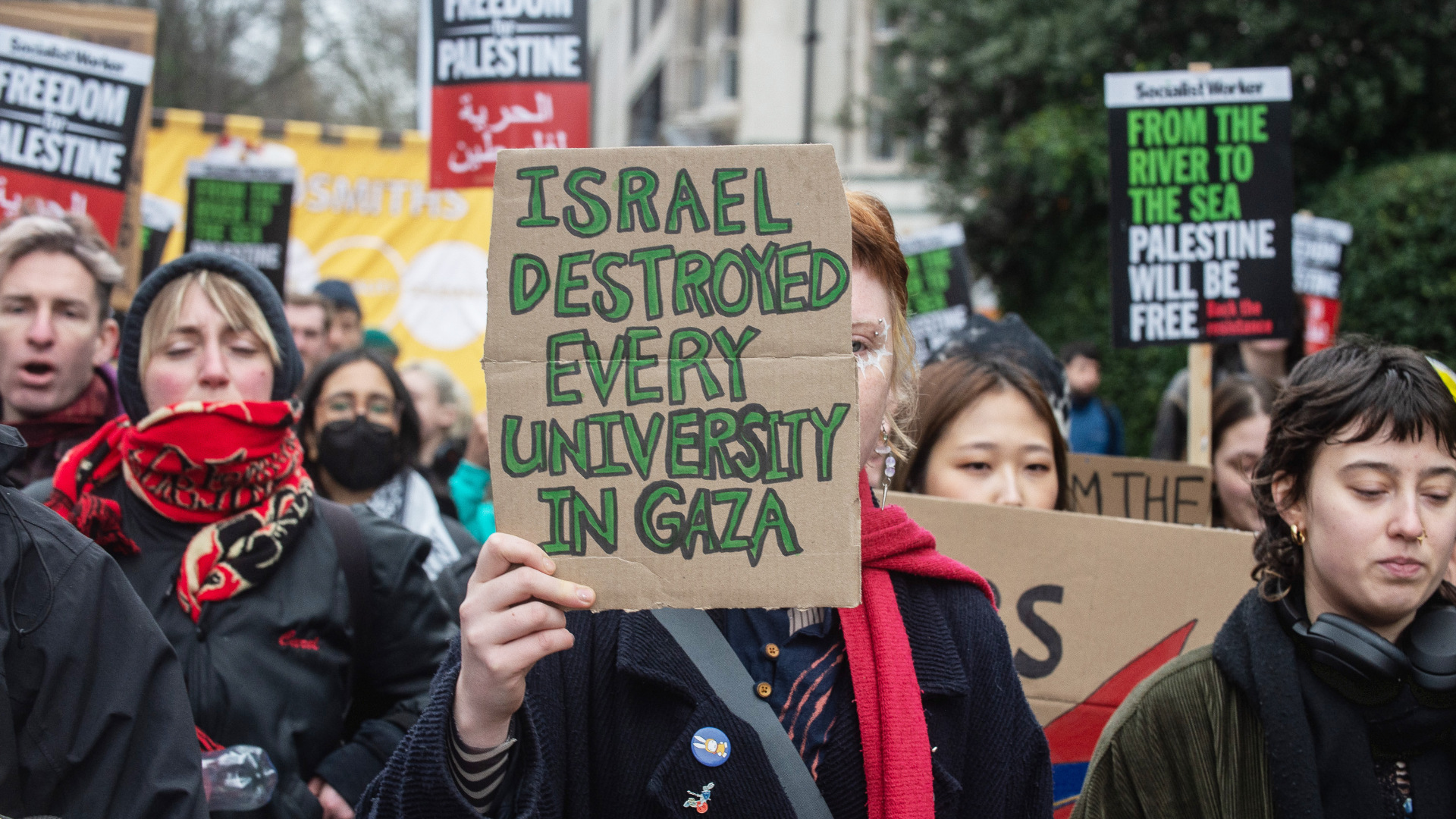Currently hanging from the upper floor windows of my university’s largest lecture hall are banners denouncing what protesters see as “genocide” and “apartheid” in Gaza.
For the past week, lectures have been moved elsewhere as students have occupied the building. Calling for change and divestment of university funds in Israeli-owned businesses, they have disrupted university teaching in order to draw attention to the crisis in Gaza.
At midday, each day, a large roll of white paper is unravelled in the centre of the university’s campus. The name of each Palestinian killed in the conflict is written there. New names are added each day.
The mood, both on campus and off, is sober. For politically engaged students, this is a watershed moment in their political coming of age. It’s their Iraq war moment. It’s their Vietnam. Calls for a ceasefire, to show solidarity and to put pressure on those in power flood across social media.
Graffiti urging an end to the war cascades down walls and across bins. Once it has been washed off by university staff, it reappears again a few days later. You would have to hole yourself up in your house, cut off from all media, with no Instagram or TikTok, to avoid the calls for a ceasefire. This is the anger of a generation that’s had enough of politicians not doing enough.
Labour was meant to be the party that did do enough. It was the party that didn’t break the Covid rules, that cared about the less privileged in our society, that brought dignity back to politics. And yet, as one friend points out, the former human rights lawyer who now leads the party has refused to stand up against the most acute humanitarian crisis of this decade.
Talking to friends, it’s evident how important a ceasefire in Gaza is to them, and how alienated they feel that Labour has apparently abandoned them on this point. It has confirmed nagging doubts some people have had about Labour’s ability to be a beacon of new hope.
It has also made people very wary of Labour’s leadership. One friend told me how shocked they were at the apparent lack of concern for the plight of Palestinian civilians. Another told me how disappointed they were that the party didn’t show better moral judgement. Another shared frustration that they’re ignoring such an important, terrible issue.
When I ask if they would still vote for Labour, one replied: “through gritted teeth”. Another told me they would, but only as a tactical vote.
The party’s tapdancing over the issue does not seem to have damanged it in national polls – on Monday, Ipsos put them 27% ahead of the Conservatives, on 47% – but it does not come without risk.
At the 2019 election, young people voted overwhelmingly for Labour. According to YouGov, the party picked up 56% of the vote among 18- to 24-year-olds. In contrast, the Tories only got 21% of that cohort. The numbers are almost the same among 25- to 29-year-olds – it’s not until you get into the 40-49 bracket that the Tory Party outpolls Labour.
Views on Israel and Palestine mirror this voting pattern. According to data from Ipsos, people aged 18-34 are more likely to want the UK government to support the Palestinians, while people aged 55-75 are more likely to support Israel. In other words, the young are more likely to vote Labour and support Palestine.
But polling by YouGov shows that a majority of British people who support Palestine think Starmer has handled the situation badly – 67%. There will be a significant number of younger voters contained in that figure.
Thoughts of polling are not foremost in the minds of those appalled by Labour’s fence-sitting. A friend who used to be a member has resigned. He says the party left him before he left it.
He says he is shocked by what he sees as a repugnant lack of empathy for Gaza’s civilians. When I asked what Starmer could do to win him back, he chuckled: “Best of luck to them; I’m voting Green. The shambolic showdown over the SNP’s ceasefire bill helped make up his mind – he won’t return to its ranks under Starmer.
The huge section of Gen-Z that should naturally vote Labour is at odds with Starmer over Gaza. But it goes further than that: polls indicate that two-thirds of the UK backs a ceasefire in Gaza, and the Rochdale by-election shows how that swell of opinion can be used to political effect.
Labour is still seen as the lesser of two evils, but other politically active people my age are starting to think that there could be better options available. For many of my friends, a vote for the Greens has suddenly become a lot more attractive.
I ask another friend how he can be won back to the Labour Party. Starmer needs to stop playing the role of the likeable, lukewarm middleman, he says. If there was more ambition, more assertiveness in his policies – if Starmer could better articulate what my friend called “the moral point of view” – then maybe.
There’s no doubt that Gaza is a huge deal for young people, especially the politically engaged. But I also worry for those whose interest in politics is a bit less intense – the ones who are on the verge of becoming politically active, and who will do so in the shadow of these divisive years.
Gaza, and the failure of Labour to grasp the issue, could cause a permanent rupture in their support. A generation ago, the Liberal Democrats faced a collapse in student support after they ditched their pledge to scrap tuition fees. Labour, once a viable alternative to the Tories, is undergoing a similar fall.
Taking more of a principled stance would be a step in the right direction. But perhaps we’ve all become more cynical now. Even if Starmer changes tack tomorrow, a lot of people I know would probably see it as pandering.
Labour has lost the trust of a usually faithful section of its supporters. It has made its bed. Now it has to lie in it.
Abigail King is opinion editor of Edinburgh University’s The Student newspaper



